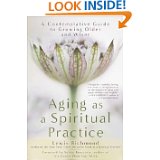 Since the 2012 publication of my book Aging as a Spiritual Practice: A Contemplative Guide to Growing Older and Wiser, I have been leading workshops and working with groups to explore how to negotiate the path of aging in today’s complex and hyper-busy world. Among baby boomers one of the challenges is being caught in middle between two other generations: children and aging parents. If the children span the ages from young school-age to adult, two generations expand to three!
Since the 2012 publication of my book Aging as a Spiritual Practice: A Contemplative Guide to Growing Older and Wiser, I have been leading workshops and working with groups to explore how to negotiate the path of aging in today’s complex and hyper-busy world. Among baby boomers one of the challenges is being caught in middle between two other generations: children and aging parents. If the children span the ages from young school-age to adult, two generations expand to three!
Recent studies show that 35% of young adults in their 20s still living with parents—with more still relying on their parents for financial and emotional support. In addition, our parents’ generation is living longer than any in history—into their 80s, 90s, and even beyond.
This state of affairs is new and unprecedented and there are no guidelines for how to negotiate it. Add to it the fact of a generation of baby boomer mothers who have in many cases pursued independent careers and are still working into their 50s and 60s (another new societal phenomenon) and we see that for midlife mothers this decade has become the triple witching hour for responsibility and stress—helping adult children, caring for aging parents, and pursuing their own busy lives.
The consequences of this multi-layered stress are predictable—exhaustion, frustration, resentment, and a sense of being trapped with no easy way out. I can describe this whole situation in one word—loss. When I teach about aging one of my core themes is that aging is marked by loss. As we get older we lose many things—our youthful vitality and good health, our earlier hopes and dreams, our sense of openness and possibility, and as we move into our 50s and 60s we start to lose friends and loved ones to illness, disability, and death.
So as these losses pile up they add to the feelings of exhaustion and stress. When I speak of loss in my workshops, peoples’ faces become serious. They know what I say is true. I also point out that loss is not the whole story of aging. Aging can also bring gifts—aspects of our life that we have not lost, and positive new developments that aging has brought to us.
In the midst of the daily grind, it is natural to focus on the losses rather than the gifts. So I hand out paper and pencils and ask people to engage in an inquiry. “On the left,” I say, “write down all the losses you have incurred as a consequence of growing older. Think of a loss as something you used to have that you do not have any more.” Examples of losses might be loss free time, of physical attractiveness, of no longer being seen, of an open-ended future, of your children being young, of your parents taking care of you rather than the other way around.
Then I say, “On the right list the gifts in your life right now.” Examples might be adult children having a new appreciation of you, reconciliation with your previously estranged parents, financial security (if you have it), new friends or intimate relationships, and so on.
You can do this exercise yourself. Some of the items on your two lists may seem obvious, while others might be ones you haven’t thought of until you picked up the pencil and started writing. Circle items on the two lists that are new or surprising. Which list is longer? Which list has more circles on it?
Once you have completed these lists, take some time to feel what you have done and consider what you have learned. People often discover hidden losses that they hadn’t previously thought of as losses¸ and discern gifts previously hidden. Our unconscious mind participates when we make these lists, and the inquiry is partly a way for our deeper mind to convey its wisdom to our surface mind.
As a final step, review the list of gifts and apply a feeling of gratitude to each one of them. Gratitude is one of aging’s hidden gifts. I like to say that gratitude is an inch deep and a mile wide. In other words, in the midst of activity and work, gratitude is always there, though it may be beneath the surface. Whenever we receive a gift our natural response is to say thank you, so do that now. “Thank you” will not erase the sting of life’s difficulties, but it will ease it, and that itself is a cause for thanks.
Lewis Richmond is a Buddhist meditation teacher and is the author of four books, including Work as Spiritual Practice and the recent Aging as a Spiritual Practice: A Contemplative Guide to Growing Older and Wiser. He is the founder of The Vimala Sangha, a meditation group in Northern California (http://www.VimalaSangha.org). His personal website ( http://www.LewisRichmond.com ) has information about his activities, teachings, and writings.
